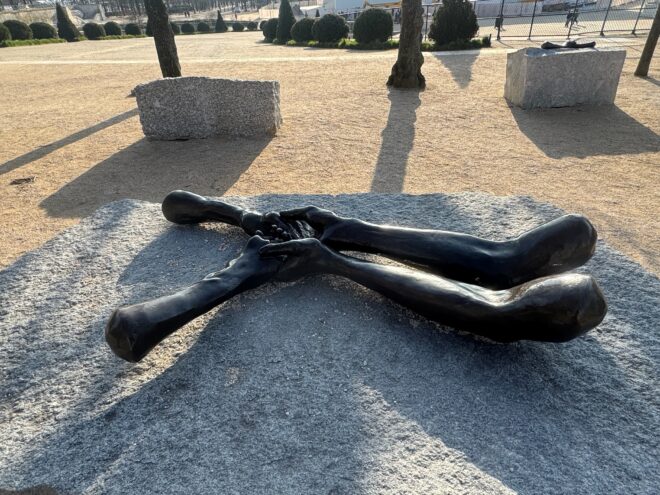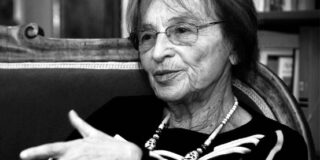
The first time I discussed this topic was in a post from May 31, 2013 titled “There is a dream dreaming us.” My thoughts on the topic have evolved over the intervening 12 years.
The struggle against evil is a timeless human endeavour, yet it harbours a profound paradox: how do we oppose malevolence without adopting its traits? An ancient French proverb warns that we tend to become what we oppose, a caution echoed in the call to accept full responsibility for our actions while expecting others to do the same for their reactions. This dual responsibility forms the cornerstone for addressing evils, from systemic injustices to global conflicts. The solution lies in turning to the “spiritual sources in our natural selves,” where, as the indigenous people of Africa suggest, a “good dream” dreams us – a vision of connection we live badly.
African philosophy, particularly the Bantu concept of ubuntu (“I am because we are”) and the Yoruba concept of ase (life force or creative power), provides a robust framework, emphasising relational ethics, spiritual vitality and communal harmony. By aligning with the good dream, embracing the ethical and spiritual guidance of ubuntu and ase and recognising shared displacement, we can fight evil without becoming it and build a “community which is coming.” This essay explores the philosophical, spiritual and practical dimensions of this challenge, with a deepened focus on African philosophy, particularly ubuntu and ase and detailed African examples to illustrate their transformative potential across diverse contexts.
The Paradox of Opposing Evil
The risk of becoming what we oppose is deeply rooted in human psychology. When confronting evil – whether oppression, violence, or injustice – our instinct is to resist forcefully, yet this can lead us to mirror the qualities we condemn. The Rwandan Genocide of 1994, where Hutu extremists massacred over 800,000 Tutsis and moderate Hutus, saw cycles of retribution that risked perpetuating hatred. In contemporary Africa, conflicts over resources, such as in the Democratic Republic of Congo’s artisanal mining regions, often see opposing factions adopt similar tactics of violence and exploitation. Globally, ideological battles, like those over governance models in polarised societies, frequently devolve into mutual dehumanisation. This occurs because opposition can trap us in a reactive cycle, internalising evil’s logic. The French proverb’s wisdom lies in recognising that evil is a potential within us all.
African philosophy offers a profound lens to address this paradox. The Bantu concept of ubuntu, articulated by thinkers like Desmond Tutu and John Mbiti, posits that personhood is relational: “I am because we are.” It emphasises ethical conduct that preserves communal bonds, preventing us from adopting evil’s divisive tactics. The Yoruba concept of ase, the divine life force that empowers creation and action, complements ubuntu by urging individuals to wield their power responsibly to maintain cosmic and social balance. The Akan proverb “Wisdom is not in one head alone” advocates collective reflection to temper reactive impulses. Together, these African frameworks align with the call to ground actions in responsibility, spiritual agency and collective well-being, ensuring we fight evil without becoming it.
African Philosophy: A Foundational Framework
African philosophy is a rich, dynamic field encompassing the intellectual traditions of the continent’s over 3,000 ethnic groups. Unlike Western philosophy, which often prioritises written texts and individual authorship, African philosophy is rooted in oral traditions, communal dialogues, rituals and practical concerns. Its defining characteristics include:
• Communality: Knowledge is a collective endeavour, as reflected in Akan proverbs like “Wisdom is not in one head alone,” which emphasise shared understanding over individual genius.
• Holistic Worldview: It integrates spiritual, physical and social realms, as seen in Yoruba ase (life force), Dogon Nommo (creative word), or Zulu umoya (breath of life), rejecting Western dualisms like mind versus body.
• Practical Orientation: African philosophy addresses real-world challenges, such as justice, community cohesion and survival, as exemplified by ubuntu’s relational ethics and ase’s ethical agency.
• Diversity and Pluralism: From Akan moral philosophy to San cosmology, African thought resists homogenisation, reflecting the continent’s cultural and linguistic diversity.
Key schools of African philosophy illuminate the themes of my argument:
• Ethnophilosophy: Placide Tempels’ Bantu Philosophy (1945) systematises indIgenous worldviews, highlighting the concept of vital force, akin to ase and the spiritual essence of the good dream.
• Philosophic Sagacity: Henry Odera Oruka’s interviews with Kenyan sages demonstrate critical individual reasoning within cultural traditions, supporting my emphasis on responsible action.
• Nationalist-Ideological Philosophy: Kwame Nkrumah’s Consciencism and Julius Nyerere’s Ujamaa (African socialism) root modern nation-building in African communalism, aligning with the vision of a coming community.
• Professional Philosophy: Kwasi Wiredu and Paulin Hountondji advocate “conceptual decolonisation,” urging Africans to rethink Western categories like “personhood” or “truth” through indigenous lenses such as ubuntu and ase.
• Hermeneutical Philosophy: Scholars like V.Y. Mudimbe analyse African identity through narratives and art, complementing the focus on shared displacement.
Central themes in African philosophy – ubuntu, ase, spirituality, ethics and decolonisation – directly inform my thinking. Frantz Fanon’s The Wretched of the Earth addresses displacement through decolonial identity reclamation, while John Mbiti’s concept of cyclical time, where the past and present coexist, supports healing alienation. Yoruba ase, as a dynamic force, underscores the spiritual and ethical agency needed to fight evil responsibly, complementing ubuntu’s relational framework.
Yoruba Ase: The Life Force of Creation and Ethical Action
Ase (pronounced ah-shay) is a foundational concept in Yoruba philosophy, originating among the Yoruba people of Nigeria, Benin and Togo and extending to their diaspora in Brazil, Cuba and beyond. Often translated as “life force,” “authority,” or “the power to make things happen,” ase is the divine creative energy bestowed by Olodumare, the Supreme Being, that permeates all existence – humans, deities (orisa), ancestors, nature, words and actions. It is both a metaphysical principle and a practical force, central to Yoruba ontology, ethics and spirituality. Key aspects include:
• Ontological Foundation: Ase is the essence of being, enabling creation, transformation and existence. It flows through all things, connecting the spiritual realm (orun) and the physical world (aye). For example, during Yoruba rituals, priests (babalawo or iyalawo) invoke ase through incantations (ofo) to effect change, such as healing a community member or blessing a harvest, aligning with the good dream’s vision of a purposeful narrative.
• Ethical Responsibility: Ase carries a moral imperative to uphold iwa rere (good character) and maintain cosmic balance (iwontunwonsi). Misusing ase, such as through curses or selfish acts, disrupts harmony, resonating with the warning against becoming evil. A Yoruba proverb, “Ase ni owo, owo ni ase” (“Ase is wealth, wealth is ase”), reflects its role in empowering ethical action for communal good.
• Communal and Individual Agency: While individuals possess ase (e.g., a leader’s authoritative speech or an artist’s creative work), its greatest expression is communal. During the Olojo festival in Ile-Ife, Nigeria, thousands gather to honor Ogun (the orisa of iron) through collective prayers and dances, amplifying ase to renew community bonds and spiritual vitality, echoing ubuntu’s relational ethic.
• Spiritual Dynamism: Ase is invoked through words, rituals, art and performance. The spoken word, particularly in ofo or oriki (praise poetry), carries ase to influence reality. For instance, a Yoruba diviner’s incantations during Ifa divination channel ase to guide community decisions, resonating with the good dream’s spiritual agency. In the diaspora, Brazil’s Candomblé practitioners invoke axé (derived from ase) in rituals, connecting communities to Yoruba roots.
Ase’s practical applications are evident in African and diasporic contexts. In Nigeria, the Ooni of Ife, a Yoruba traditional ruler, mediated ethnic tensions between Yoruba and Hausa communities in 2021, invoking ase through ceremonial blessings to foster peace, demonstrating responsible leadership. In Benin, Vodun priests use ase-infused rituals to resolve community disputes, ensuring actions align with cosmic harmony. In Cuba, Santería’s aché rituals empower devotees to address social challenges, like economic hardship, through communal solidarity. Ase complements ubuntu by providing the spiritual and creative power behind ethical action, aligning with the call to turn to our natural selves to resist evil’s pull.
Ubuntu: A Complementary Relational Ethic
Ubuntu, originating among Bantu-speaking peoples like the Zulu, Xhosa and Ndebele, derives from the phrase umuntu ngumuntu ngabantu (“a person is a person through other people”). It is a worldview that shapes ontology, epistemology and ethics, viewing humanity as inherently relational. Key features include:
• Relational Personhood: Mbiti’s statement, “I am because we are and since we are, therefore I am,” ties identity to community, challenging Western individualism. A person’s worth lies in their contributions to collective well-being, not individual achievement.
• Ethical Responsibility: Ubuntu demands actions that foster harmony, aligning with the dual responsibility framework. In Xhosa tradition, indaba (communal dialogue) resolves disputes by prioritising reconciliation. For example, in South Africa’s Eastern Cape in the early 2000s, indaba sessions mediated land disputes between neighbouring villages, ensuring equitable solutions that preserved community ties.
• Spiritual Dimension: Ubuntu integrates material and spiritual realms. The Zulu concept of umoya (breath of life) suggests a shared spiritual essence, resonating with ase and the good dream’s transcendent narrative.
• Inclusivity and Empathy: Ubuntu extends to adversaries, as demonstrated in Desmond Tutu’s Truth and Reconciliation Commission (TRC) in South Africa, where apartheid’s victims and perpetrators shared stories to foster national healing. In KwaZulu-Natal during the 1990s, ubuntu-inspired dialogues reconciled supporters of the African National Congress (ANC) and Inkatha Freedom Party (IFP), preventing further political violence.
Ubuntu’s practical applications are extensive:
• Restorative Justice: In Rwanda, post-1994 genocide, gacaca courts (2001–2012) processed over 1.9 million cases, using ubuntu-inspired dialogues. Perpetrators confessed crimes, victims offered forgiveness and communities negotiated reparations, such as rebuilding homes, fostering trust. In Uganda, Acholi mato oput ceremonies reintegrated former Lord’s Resistance Army (LRA) rebels through rituals, including drinking bitter herbs (oput) to symbolise shared healing, conducted under community elders’ guidance.
• Social Activism: Nigeria’s #EndSARS protests in October 2020 against police brutality embodied ubuntu’s collective spirit. Youth organised community aid, distributing food and medical supplies and held town hall dialogues to strategise reforms, demonstrating relational ethics despite state repression.
• Education and Community Development: In Mali, schools inspired by the Akan concept of sankofa (“return and fetch it”) teach communal values alongside academics. Students participate in collective projects, such as village cleanups or cooperative farming, reflecting ubuntu’s emphasis on shared responsibility.
• Environmental Stewardship: In Botswana’s Okavango Delta, ubuntu-informed ecotourism involves San communities managing resources, viewing nature as part of the communal self. This approach, supported by ase-like rituals blessing the land, contrasts with exploitative models, promoting sustainability.
While ubuntu emphasises relational ethics, ase empowers the spiritual and creative agency behind those ethics, together anchoring the vision of fighting evil without becoming it.
The Dual Responsibility Framework
The solution – accepting full responsibility for our actions and expecting others to account for their reactions – finds a natural ally in ubuntu and ase. These “two halves that make the whole” ensure accountability in conflict. Ubuntu frames responsibility as a communal act, while ase demands that power be wielded ethically to maintain harmony. No provocation, however severe, absolves us from acting justly, nor can others justify harmful reactions by pointing to our misdeeds.
In South Africa, the TRC (1995–2002) exemplified this framework. Perpetrators of apartheid’s atrocities were required to take responsibility by publicly confessing their actions, while victims were encouraged to respond with forgiveness, guided by ubuntu’s ethos of reconciliation. The process was often accompanied by ase-like rituals, such as prayers and blessings by traditional leaders, to sanctify the healing process. In Rwanda, gacaca courts balanced perpetrators’ confessions with community-driven restorative outcomes, such as collective labor projects, reflecting ubuntu’s harmony and ase’s transformative power. In Nigeria, during the #EndSARS protests, activists took responsibility by organising peaceful demonstrations and community support, expecting authorities to respond accountably, though state violence highlighted the challenge of mutual responsibility.
Globally, the Sierra Leone Truth and Reconciliation Commission (1999–2002) post-civil war used ubuntu-like community dialogues, where child soldiers and rebel leaders shared testimonies. Traditional healers invoked ase-inspired rituals, such as communal prayers and cleansing ceremonies, to empower healing, ensuring both sides upheld ethical responses. In Benin, Vodun priests mediate disputes using ase-infused rituals, requiring conflicting parties to take responsibility for actions and align reactions with communal well-being, as seen in resolving land conflicts in Porto-Novo in 2019. These examples demonstrate how ubuntu and ase work in tandem to break cycles of violence, aligning with the call for a dual responsibility framework.
The Good Dream: A Spiritual Anchor
A powerful metaphor from the indigenous people of Africa: “there is a dream dreaming us.” This “good dream” is a spiritual source within our natural selves – a vision of connection, purpose and belonging that transcends the conflicts of the civilised world. Likely drawing from traditions like the San people’s trance dances, where shamans enter a collective spiritual realm to heal communities, or the Yoruba’s ase, which animates creation and action, the dream suggests we are participants in a benevolent narrative that shapes our potential for good. We live this dream “badly” due to the conflict between our natural self, intuitive and tied to community and our civilised self, shaped by societal norms and individualism, which often prioritises power and control.
Ubuntu and ase enrich this concept by framing the good dream as a communal and spiritually empowered reality. Ubuntu emphasises the relational nature of the dream, where belonging emerges from interconnectedness, as Mbiti’s phrase underscores. Ase provides the creative and spiritual force behind the dream, empowering individuals and communities to manifest its vision of harmony. For example, in Yoruba tradition, the ofo incantations spoken by diviners (babalawo) during Ifa divination rituals channel ase to align community decisions with cosmic purpose, resonating with the good dream’s call to transcend conflict. The San’s trance dances, performed under starlit skies, involve shamans entering a spiritual realm to connect with ancestors and animals, weaving a cosmic web of life that heals communal rifts, mirroring the dream’s vision of unity. The Xhosa’s umngqungqo ceremonies, where rhythmic dances honour ancestors, unite communities in a shared spiritual experience, embodying the dream’s communal spirituality. The Himba of Namibia’s okujepisa omukazendu rituals, where families honor deceased relatives through offerings and dances, strengthen communal bonds, reflecting ase’s life force and ubuntu’s relational ethic. The Dogon of Mali’s sigui ceremonies, held every 60 years, celebrate cosmic renewal through elaborate dances and masks, aligning with the good dream’s transcendent narrative.
In Burkina Faso, Mossi naaba (chiefs) mediate disputes using ase-like rituals, invoking ancestral wisdom through libations and prayers to restore harmony, embodying the practical spirituality of the good dream. In Nigeria, the Yoruba Olojo festival, where the Ooni of Ife wears the sacred Are crown to renew communal ase, draws thousands to pray for peace and prosperity, reflecting the dream’s vision of collective purpose. These traditions illustrate how African philosophy’s holistic worldview, which rejects dualisms like spiritual versus material, offers a path to reconcile our natural and civilised selves. By integrating the natural self’s spiritual connection with the civilised self’s reflective capacity, we align with the good dream and resist the pull of evil.
Transcending Displacement
Displacement, both personal and collective, is a central theme in this discussion. On a personal level, it manifests as alienation – the sense of not belonging to ourselves or our world, exacerbated by modern materialism and globalisation. Collectively, displacement is evident in African communities affected by historical and ongoing injustices, such as the San people, forcibly evicted from their ancestral lands in Botswana’s Central Kalahari Game Reserve, or the Igbo communities displaced during Nigeria’s Biafran War (1967–1970). African philosophy, through ubuntu and ase, counters this alienation. Ubuntu affirms that identity is rooted in communal relationships, while ase empowers individuals and communities to reclaim their spiritual and creative agency, restoring a sense of purpose and belonging. Mbiti’s concept of cyclical time, where the past, present and future coexist, suggests that displacement can be healed by reconnecting with collective roots and ancestral wisdom.
There is a radical solution: by sharing our sense of displacement, we discover that we are not alone, transforming alienation into the foundation for a “community which is coming.” This resonates deeply with ubuntu’s relational ethic and ase’s empowering force. In Kenya, following the 2007–2008 post-election violence that displaced over 600,000 people, ubuntu-based community dialogues in Nairobi’s Kibera slum brought together Luo and Kikuyu groups. Elders facilitated story-sharing sessions, where participants recounted losses and fears, while traditional healers performed ase-like blessings with herbal remedies to foster healing and reconciliation.
Conclusion
In conclusion, the challenge of fighting evil without becoming evil is one that demands a deep engagement with the ethical, spiritual and communal dimensions of our existence. African philosophy, through the lenses of ubuntu and ase, provides a vital framework for understanding our interconnectedness and the moral responsibilities that come with it. By embracing the good dream – a vision of collective harmony and purpose – we can navigate the complexities of our world with integrity, compassion and a commitment to justice. As we reflect on our roles in the ongoing struggle against evil, let us remember the wisdom of our ancestors and the power of community, striving to build a future that honours the dignity of all. Together, we can create a world where we fight evil without becoming it, fostering a “community which is coming” – a vision of hope for generations to come.


